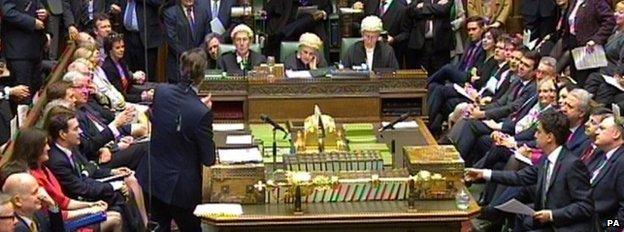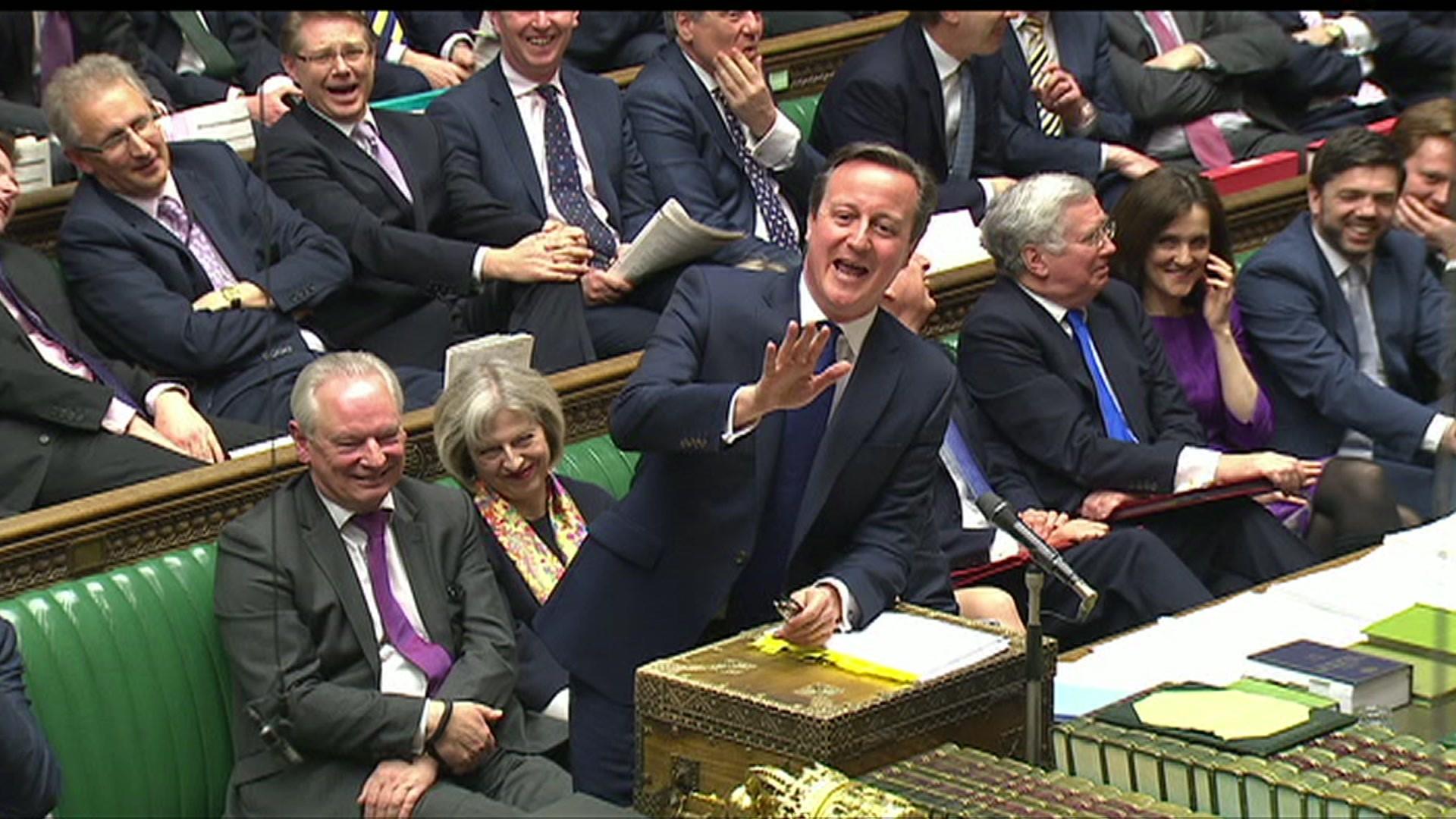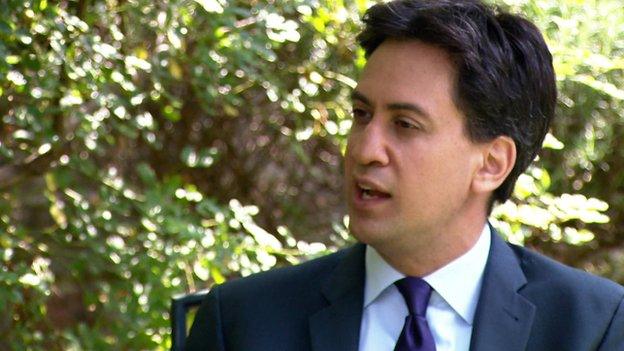Labour and Tories trade pledges not to hike VAT and NI
- Published
Ed Miliband quotes the prime minister about giving straight answers and challenges him to rule out a post-election rise in VAT
David Cameron ruled out an increase in VAT if he retains power at the general election in his final Commons clash with Ed Miliband before polling day.
The prime minister said this was a "clear promise" and challenged the Labour leader to rule out increasing National Insurance.
Mr Miliband said "nobody would believe" Mr Cameron's pledge, because his government had raised VAT in 2010.
Labour later announced it would not put National Insurance up.
Mr Cameron's announcement was designed to neutralise one of Labour's main lines of attack - as seen on an election poster unveiled this week - that the Conservatives are secretly plotting to increase VAT because they will not be able to make their spending cut plans work without it.
The announcement appeared to take Conservative MPs by surprise, especially after Chancellor George Osborne repeatedly declined to rule out a VAT increase when questioned by MPs on Tuesday.

Analysis by political correspondent Iain Watson
Today's exchange actually raises more questions than it answers.
If the main parties are ruling out further potential sources of revenue, but still committing themselves to eradicating a £90bn black hole in the public finances, will they now be under more pressure during the election campaign to spell out in much greater detail exactly what they intend to cut?

The Conservatives have repeatedly accused Labour of secretly plotting to increase National Insurance contributions - but shadow chancellor Ed Balls has now ruled this out.
Speaking just over an hour after Prime Minister's Questions, he told BBC News: "We will make it clear in the manifesto Labour will not be raising NI. That will be a clear pledge from us."
Shadow Chancellor Ed Balls tells the BBC that Labour would not increase National Insurance
He accused Mr Cameron of making an "out of the blue, panicky" announcement on VAT that "no one in Britain will believe".
Labour, which has already announced plans to increase the top rate of income tax and impose a new "mansion tax" on high value properties, insists its plans are fully costed and will not require additional tax hikes if it wins May's general election.
'Retirement plans'
Mr Miliband began his final head-to-head encounter with Mr Cameron before the election by joking that the PM had "announced his retirement plans" - a reference to a BBC interview in which the prime minister said he would not serve a third term if the Tories remained in power.
Challenging Mr Cameron to give a "straight answer to a straight question", Mr Miliband pressed him on whether he would rule out a rise in VAT after the election, as Labour had done.
In response, the prime minister immediately said "yes", prompting loud cheers in turn from the Conservative benches.
BBC archives recall highlights of PMQs over the last five years.
He contrasted what he said was a "clear promise" with Labour's unwillingness to rule out a rise in National Insurance.
"I answered a very simple question about VAT. I ruled out an increase... straight answer to him, straight question from me. I have ruled out VAT. Will he rule out national insurance contributions. Yes or no?"
Mr Cameron added: "We all know this is Labour's job tax. This is their tax of choice. This is what they clobber working people, families and enterprises with."
But Mr Miliband responded by saying there was "only one person who is going to raise taxes on working families and that is him".
He said nobody would believe Mr Cameron on VAT "because of his extreme spending plans, because his numbers do not add up and because he promised it last time and broke his promise".
Mr Cameron, he added, had broken other promises made before the last election to reduce annual net migration below 100,000 and not to pursue a major structural re-organisation of the NHS, adding that it was "time for a better plan and time for a Labour government".
'Held hostage'
But Mr Cameron suggested a future Labour government would result in the "chaos of economic crisis", with Ed Miliband being "held hostage" by the SNP.
The packed session provided a last opportunity for the two men to rally their MPs and set out their arguments before the start of the election campaign next week.
Speaking after the exchanges and the other parties' tax pledges, deputy prime minister Nick Clegg said the Lib Dems "don't need to raise VAT, national insurance or headline rates of income tax or corporation tax either".
"There are other taxes and other tax loopholes that we can increase or close in order to balance the books," he said.
Parliament is expected to be prorogued on Thursday ahead of a six-week campaign culminating in the 7 May poll.
The next PMQs is not expected to take place until the end of May, once the make-up of the new government has been decided.

What is Prime Minister's Questions?

PMQs is a weekly opportunity for the leader of the opposition and backbenchers from all parties to question the prime minister
The session lasts about thirty minutes, with the leader of the opposition allocated six questions and backbenchers entering a ballot to pose questions
This was the 162nd and final PMQs of the current Parliament.
David Cameron has taken part in 151 sessions since May 2010, with Nick Clegg and William Hague substituting for him on 11 occasions
Before 1997, the session took place twice a week, lasting 15 minutes on Tuesday and Thursday afternoons
The first televised PMQs was on 21 November 1989, when Margaret Thatcher clashed with Neil Kinnock
Tony Blair has the highest attendance record of any recent prime minister, attending 95% of sessions between 1997 and 2007

- Published25 March 2015

- Published27 July 2014

- Published13 October 2010